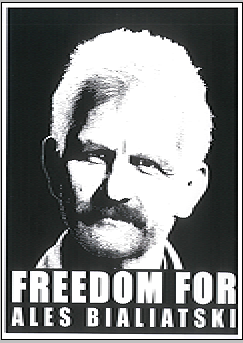On November 24, the court in Minsk found Bialiatski guilty of “concealment of profits on an especially large scale”, under Article 243, part 2 of the Criminal Code of Belarus. Bialiatski was subsequently convicted to a prison sentence of 4 years and 6 months, with all assets confiscated.
Bialiatski founded the Minsk-based Viasna (’Spring’) Human Rights Centre in 1996. Under his leadership, Viasna has provided financial and legal assistance to political prisoners and members of their families in the uncertain political and social climate of Aleksandr Lukashenko’s Belarus. Viasna’s work also includes election monitoring, human rights education, and the much-needed promotion of democracy in Belarus.
A violent past
Ales Bialiatski’s arrest comes as no surprise. Under President Aleksandr Lukashenko’s seventeen-year leadership, the Belarusian government has systematically undermined the rule of law through authoritarian means.
Widely recognized as the last dictator in Europe, Lukashenko has consolidated his tyrannical power through repeated electoral manipulation. A “republic in name, although in fact a dictatorship”—according to the CIA World Factbook—Belarus has seen the gradual deterioration of democratic values since Lukashenko’s presidential victory in 1994.
During Lukashenko’s second term, a 2004 referendum eliminated presidential term limits. Subsequently, Lukashenko ran and won the presidential post in 2006 and 2010. The heavily-muted Belarusian opposition and the international community severely criticized both elections for falling well short of international standards.
Seven opposition leaders of the 2010 presidential elections have since been arrested in the post-election crackdown. Several candidates were subsequently beaten and tortured, while others were sentenced to five or more years in jail.
Exiled Belarusian presidential candidate Ales Michalevic was arrested by the KGB, the Belarusian secret police, on claims of organizing “mass disturbances.” Now on tour throughout Canada, he recalls the harsh reality of the situation:
“The first three days were not bad,” Michalevic said. “Then people with masks appeared, and the torture began.”
Forced to sleep upright under glaring lights and woken several times a night, the presence of torture in twenty-first century European politics is both undeniable and unpardonable.
“Like Moammar Gadhafi in Libya,” Michalevic added, “[Lukashenko] has chosen to fight his own people.”
No stop in sight
Lukashenko’s overbearing fear of the Belarusian population continues to reach new heights, as his unrivaled presidency also continues. The politically motivated nature of Alex Bialiatski’s arrest and trial points to a desperate suppression of any possible social backlash, similar to that of Ukraine’s Orange Revolution of Georgia’s Rose Revolution.
“Ales Bialiatski has been caught up in Belarus’ ugly crackdown on human rights defenders and activists. The Belarusian authorities have the right to punish tax evasion as a crime, but these charges are clearly politically motivated and have been created simply to silence his human rights work,” said John Dalhuisen, Amnesty International’s Deputy Director for Europe and Central Asia.
Extensive evidence points to the corruption and illegality of the prosecution’s proceedings in the Minsk court.
Whereas Belarus law requires certified copies of bank print-outs for such documents to be legally valid evidence in a court of law, the prosecution presented uncertified copies from Bialiatski’s Lithuanian and Polish bank accounts.
The prosecution also presented alleged copies of private e-mail correspondence from one of Bialiatski’s colleagues, without establishing the necessary legal authority to conduct surveillance of private e-mail exchange, as required by Article 13 of the Belarusian Law on Investigative Activities.
Further, during the standard pre-trial questioning, two witnesses from the local tax inspectorate gave answers that were “identical to the point of grammatical mistakes,” reported Human Rights Watch on November 24.
Of the aforementioned “evidence” presented by the prosecution, the court deemed every testimony and submission legal and permissible.
Since Bialiatski’s politically motivated arrest, Lukashenko has introduced legislation expanding the scope of the Belarusian KGB’s already extensive power; the secret police no longer face any restrictions on the use of their weapons. Moreover, Lukashenko also expanded the definition of treason and banned any form of anti-government protest.
The unprecedented deterioration of human rights in Belarus over the span of Lukashenko’s presidency, particularly since the 2010 elections, must be addressed on an international scale.
The Belarusian government’s restriction of civil liberties —including freedom of speech, press, assembly, association, and religion—and target of opposition and human rights leaders cannot stand. Now is the time for Belarus’ social revolution.
 Log in
Log in









